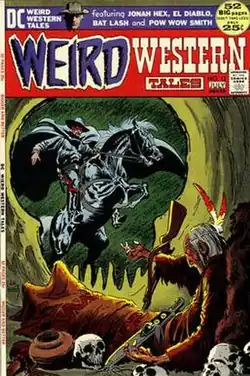Weird Western Tales
Weird Western Tales is a Western genre comics anthology published by DC Comics from June–July 1972 to August 1980. It is best known for featuring the adventures of Jonah Hex until #38 (Jan.–Feb. 1977) when the character was promoted to his own eponymous series. Scalphunter then took Hex's place as the featured character in Weird Western Tales.
| Weird Western Tales | |
|---|---|
 Cover of Weird Western Tales #12 (June - July 1972), the first issue of the series under that title; art by Joe Kubert. | |
| Publication information | |
| Publisher | DC Comics |
| Schedule | Bimonthly/Monthly |
| Format | Ongoing series |
| Publication date | List
|
| No. of issues | List
|
| Main character(s) | Jonah Hex Scalphunter Cinnamon |
| Creative team | |
| Written by | |
| Penciller(s) | |
| Inker(s) | List
|
Publication history
Original series
The original title ran for eight years and 59 issues.[1][2] It started with issue #12 (June–July 1972), continuing the numbering from the second volume of All-Star Western two issues after the first appearance of Jonah Hex.[3] The title's name was partially inspired by the sales success of Weird War Tales,[4] and signaled the loosening standards of the outdated Comics Code Authority.[5]
When Jonah Hex received his own eponymous series,[6] he was replaced as the lead feature of Weird Western Tales by Scalphunter as of issue #39 (March–April 1977).[7] The character Cinnamon was introduced in issue #48 (Sept.–Oct. 1978) by writer Roger McKenzie and artist Dick Ayers.[8] The final issue was #70 (August 1980).[1]
Revival
Weird Western Tales was revived in 2001 as a four-issue limited series.[9] This series had no relation to the earlier title, instead featuring a series of one-shot Western-based stories.
Blackest Night
A one-shot revival of the series utilizing the original numbering #71 (March 2010)[10] was published as a tie-in to the Blackest Night limited series.[11]
Collected editions
- Showcase Presents: Jonah Hex
See also
- High Moon
- Weird West, the cross-genre
References
- Weird Western Tales at the Grand Comics Database
- Overstreet, Robert M. (2019). Overstreet Comic Book Price Guide (49th ed.). Timonium, Maryland: Gemstone Publishing. p. 1148. ISBN 978-1603602334.
- McAvennie, Michael (2010). "1970s". In Dolan, Hannah (ed.). DC Comics Year By Year A Visual Chronicle. London, United Kingdom: Dorling Kindersley. p. 151. ISBN 978-0-7566-6742-9.
An instant hit with fans, Jonah Hex quickly overshadowed the other stars of All-Star Western. The series was renamed Weird Western Tales two issues later.
- Daniels, Les (1995). DC Comics: Sixty Years of the World's Favorite Comic Book Heroes. New York, New York: Bulfinch Press. p. 153. ISBN 0821220764.
Carmine Infantino and I found out that the word weird sold well'. [editor Joe] Orlando recalls. 'So DC created Weird War and Weird Western '.
- Sacks, Jason; Dallas, Keith (2014). American Comic Book Chronicles: The 1970s. TwoMorrows Publishing. p. 82. ISBN 978-1605490564.
- McAvennie "1970s" in Dolan, p. 173: "In true nomad fashion, disfigured gunman Jonah Hex rode his horse out of Weird Western Tales and into his own comic".
- McAvennie "1970s" in Dolan, p. 173: "With scarred gunslinger Jonah Hex riding off into his own series, writer Michael Fleisher and artist Dick Ayers produced a new outcast to headline Weird Western Tales. Scalphunter was 'a man who lived in two worlds, but was at home in neither'".
- Beatty, Scott (2008), "Cinnamon I", in Dougall, Alastair (ed.), The DC Comics Encyclopedia, London, United Kingdom: Dorling Kindersley, p. 83, ISBN 978-0-7566-4119-1
- Weird Western Tales vol. 2 at the Grand Comics Database
- Weird Western Tales #71 at the Grand Comics Database
- Schedeen, Jesse (October 12, 2009). "DC Reveals Plans for Blackest Night in January". IGN. Archived from the original on October 31, 2014. Retrieved October 30, 2012.
External links
- Weird Western Tales at the Comic Book DB (archived from the original)
- Weird Western Tales vol. 2 at the Comic Book DB (archived from the original)
- Weird Western Tales and Weird Western Tales vol. 2 at Mike's Amazing World of Comics